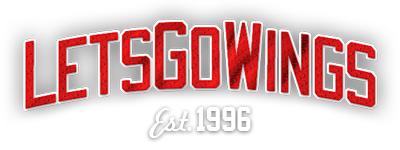

gooseman
Member-
Content Count
5 -
Joined
-
Last visited
About gooseman
-
Rank
Draftee
-
Detroit specifically is a very veteran team which the way managemetn has consistently been able to roll new tallent in that matches the system, while vets are still in place for continuity, are able to do things that most teams are not. One of those is that they walk the tightrope of what is, and what is not a penalty better than any other team in the league. For many penalties, Detroit all but sets the standard of what defines a penalty. Homer, on goalie interference for instance. Fans of other teams will constantly say he is always interfering, Wings fans of course say he is not. Me, I am not biased for or against the Wings, so I see him as a hugely talented guy who tests the rules. He parks himself with his skates out of the blue, JUST out of the blue. He does things that is another player did it, it would be a penalty, but he is more subtle about it. The officials us his typical play as the standard. If another play makes less contact or is less aggressive about it than him, no penalty. Slightly more than him (or on reputation the same as him) it is a penalty. If Homer is even slightly over his "normal" line, it is a penalty. If you will notice, most of his GI penalties are either early in a game, or late when the Wings are behind. That means hi sometimes tests a ref early in the game to see if he can get away with a little extra, or he is stepping over the line late because the team needs it. The other thing that vet players like many of the Wings get it the refs will talk to them more. This is true with any of the elite players in the league. Rather than make an early call, a good referee will talk to them, tell them their players are pushing the line on a play and need to back off, and if they do there is no call. There is more of a tendency for this to happen when the team is at home because on the road there is a gut reaction of the referee to make the call on a marginal play when the crowd reacts.
-
BTW, I certainly hope to see the Sharks as Wings both get healthy, and meet up in the WCF. I am a hockey fan, and I am not one of those that likes to see a teams get cake walks to the finals. I want to see the best playing the best. Chicago, your day will come, but I want to see the winner of SJ/Det taking on the winner of NJ/BOS. And yes, I live in SJ. But I grew up in South Bend, IN, and long had, and still have, a great deal of respect for the Wings, and the hockey they play.
-
As MacK_Attack said, referees move around quite a bit. For the most part they try to move guys around. Walkom no longer allows guys to stay paired for chunks of the season. Guys will usually work set of two or four games together, they move to another pairing. Most years, about 2/3 of the officials will end the year with 45-55% of their games in each conference. The others are usually at a 2-1 split. Most will work 4 divisions heavy, and 2 divisions light. The divisions that cause a lot of the uneven splits are the NW and PAC, where guys will tend to stay longer periods to ease travel, and again the NW with the NE, because it is easier to not have guys crossing US-CAN constantly. I am not sure what the rules are today, but it used to be that each team could request to not be assigned certain officials, and the referees could do the same. IIRC, a team could opt out of 2 officials, and officials 3 venues, and those requests would mostly be honored. I know these are not givens now, but if there is a valid reason, such as personal conflict, home town, etc., requests tend to be honored. When it is a venue issue, the official will work road games for that team. For the most part, officials are supposed to be moved around relatively evenly allowing for travel, but high profile games tend to get preferential assignment of veteran refs. If you get two very fast teams, then you are likely to see better skating officials to try to keep up. The specific anomaly you will see though is with potential explosive match-ups. If you see an Anaheim match-up with Calgary or Vancouver, it is very unlikely you are going to see a rookie ref out there. Pollock would be a very good guess as to one of the refs. And for linesmen, you are probably going to see one of Sharrers, Heyer or Cvik are likely to be in the house. These are the guys who don't take anything and are monsters as far as the linesmen go. It is not always random.
-
Walkom sees to it that Bettman does not have much to say about officials. Walkom is the boss. The competition commitee sets the standards, and then Walkom is the law for enforcing it.
-
Hi Guys. I've long stopped by, even was registered on here some time back, could not remember the ID though. I thought I would stop by and answer a few questions as best I can, not that there are any guarantees on answers, they are all just opinions. As for breaking down by call type, it is a situation that some of the patterns tend to get lost in the numbers at that point. As for dropping to just minors, it really does not move the numbers much. There are a couple teams that are lopsided on misconducts, but most teams would only move by 2-3% to drop them. Ottawa has a large differential there, 10, no one else is over 6. Detroit for instance only has a differential of 1 on the year for 10's. It you did not see, I put another sheet up there that looks at the numbers a bit differently. That first sheet was strictly how many calls there were against a team at home and on the road. Anyone looking for a big pattern, there was another half to the equation: How many calls on the other team? When you include that, it is a different picture. I made a comment that for Detroit, it almost seems like games are called by a different rule book when the Wings are home and on the road. When you look at including calls on the other team, it looks even more that way. The Wings have a lot more calls against on the road than at home, but so their opponents. Detroit's overall numbers are actually in the range of what one would expect on total calls. They have a have a +31 call advantage at home, and a -1 disadvantage on the road. The odd part with them is just that the games are simply called to a different standard as to what is a penalty when they are in the Joe than elsewhere. Whistle get put away in Hockeytown. Stl on the other hand, that from the first set of numbers look like they do better on the road, not really. They have the opposite, there is simply many more calls in the home games than their road games. When you look this way, the teams that look like they have heavily tilted home ice changes. SJ, that had exactly the same number of calls against home and road, well, the same was not true for their opponents. SJ is a -14 on the road, but +53 at home. That is the largest differential in the league. I might be in SJ, and a Sharks fan, but I am not a blind homer, and get so tired of telling the blind homers that the Sharks are not getting jobbed every game.
